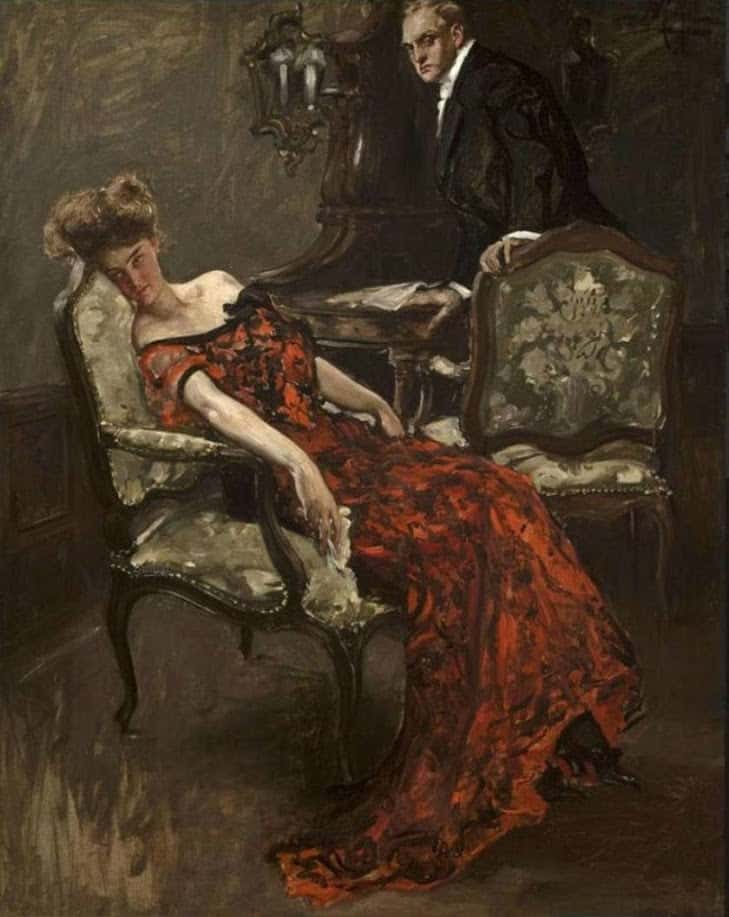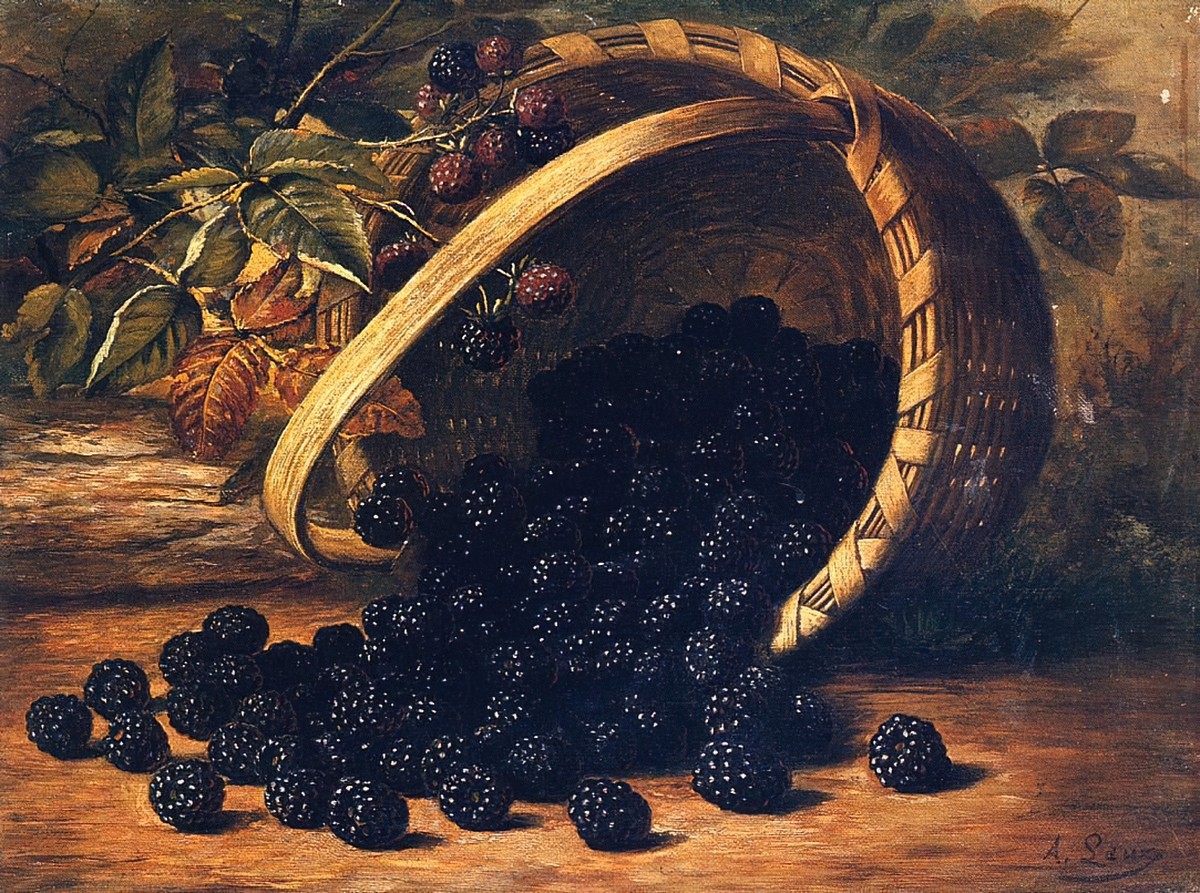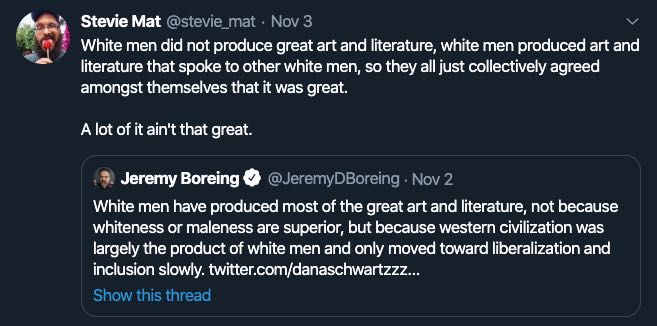“Blackberries” is a short story by Thomas Keneally, included in an anthology I got free when buying another book at Dymocks back in 2009. Allen and Unwin have since released a number of short stories from big name Australian authors as eBooks, including “Blackberries”, available for a couple of bucks each.
The marketing copy of “Blackberries” is telling:
Austin North sees himself as a fine English teacher in his local high school. His students respect him, and he finds personal fulfillment in teaching them the power of poetry to move and inspire. However, Austin’s self-perceptions are upset by his infatuation with a young Sudanese girl, a recent immigrant to Australia. When Austin realises that he is just another predator in her difficult journey, he is forced to re-examine his own values and relationships.
When composing cover copy, log lines and premises, writers are encouraged to convey ‘some sense of the outcome’. Here, the publisher reveals the main character’s arc: Don’t worry, this isn’t just another story about a middle-aged man’s hard on for a teenage girl! He does experience a character arc! He learns he’s actually a shit!
Because surely we’ve reached a cultural moment in which a mainstream thinking audience is sick and tired of profiles of ephebophilia, especially those which simply expose rather than critique, as if this phenomenon is new to any reader. As if stories which centre, and therefore prioritise, a man’s erotic desires over a woman’s are new to any reader. The title itself makes me squirm — what might “Blackberries” refer to? Or rather, to whom? Women of colour sexualised as food items is another old-ass trope. So let’s hope it’s not that.

But that final sentence of the marketing copy offers hope. Perhaps Thomas Keneally offers an interesting take in “Blackberries”? Annie Proulx is another short story writer who made use of the double-edged symbolism of blackberries in “Heart Songs”. Blackberries are sweet and delicious but also an invasive weed. Proulx’s short story offers a good contrasting text for another reason — Snipe in “Heart Songs” doesn’t change at all.
How does a person realise that his erotic desires are problematic, and impacting others badly? Austin’s character arc interests me, because how often do Anagnorisiss like this occur in reality? And if it does happen, how might we kick it off?
STORYWORLD OF “BLACKBERRIES”
- Somewhere in the Australian ‘bush’, which means rural area — oftentimes there’s little in the way of shrubbery. (This perplexed me when I first arrived here.)
- In this particular part of the New South Wales ‘bush’ there are a number of refugees, notably from Southern Sudan.
- In small towns in New South Wales (I live in one myself), sport is important. To be good at sport gives you lots of prestige.
- Refugees and immigrants have together formed the local Sudanese committee which helps new Australians settle. This has been started by an engineer (highly skilled immigrant not refugee) from Sudan. His name is David Malwai.
- Most of the Sudanese immigrants are Coptic Christians.
- Some of the teenage Sudanese boys are starting to form gangs but are still ‘better behaved than some of the Aboriginal young’. (The unseen narrator is therefore white.)
MAIN CHARACTERS OF “BLACKBERRIES”
- Austin North, English teacher
- David Malwai, Sudanese engineer
- Miriam Salong, gifted runner
- Meredith North, Austin’s wife, council worker

STORY STRUCTURE OF “BLACKBERRIES”
SHORTCOMING
Austin North sees himself as a fine English teacher in his local high school.
This is a character who doesn’t see anything wrong with himself, morally, ethically. The world’s reaction to him generally props up this self-image. Keneally shows Austin as king of his arena — enjoying the repartee with the boys (while ignoring the girls, assuming they will simply leave school and get pregnant).
— Because they are soft, poor things, said Angela Yankovich, a bright kid who was a member of some evangelical church group, at least for now. Austin had a feeling that it wouldn’t last. In six months time she would forget all that and be the girlfriend of some town hoon whom she’d think the smartest thing she’d ever met and who might steal her future from her.
— Exactly right, said Austin, more to reinforce her than because she had got the point of the poem
The name Austin derives from older names meaning “exalted, venerable”. What about his surname, North? Could the symbolism of cardinal direction be relevant here?
To cut it short, Austin North is an old school sexist, misogynist. “Blackberries” is not a comfortable read and isn’t meant to be. But the narrator, pulling away from Austin’s point of view, assures us that he’s good at his job:
Austin had a reputation as an excellent English teacher. Even the kids who pretended to get nothing out of his classes often got plenty. It was a game they played, him and them, arguing the usefulness of poetry year by year. He enjoyed the tussle — it was better than having a class full of obedient automatons who took notes frantically. And in every class, you saw a girl here, a boy there, suddenly becoming intoxicated with words. Softly and humbly…
But is it possible to be a good teacher and also a teacher who sexually objectifies female students? Isn’t ‘respecting every student as a child without assuming for them a dismal future’ a necessary element of ‘good teacher’, without which you are a ‘shit teacher’?
I push on with that question in mind.
DESIRE
On the scale of self-awareness, Austin is right up there. He’s an English teacher, so he knows all about Lolita, and he sees disturbing shades of Humbert Humbert in himself.
So although he feels this attraction for the Sudanese student, he doesn’t want it.
OPPONENT
The opening scene sets up a classroom in which Austin’s bright year tens are his opponents, but with the arrival of Miriam Salong, Austin has a new type of opposition — and he’s very uncomfortable with this one.
PLAN
So far, so good. Austin proves himself a Good Guy, right?
Except if you’re a teacher you’ll know to suspect a teacher who detains a student after class for no good reason — alone, no less. Austin goes no further than that, but if the story were told from Miriam’s point of view we might learn of her fear.
Even with a narrator who sympathises with Austin, it’s clear that Miriam can see who he is, and has disturbing hints of what he is feeling. This is not a young, naive teenager, but a girl who has seen all kinds of things. I expect she is expert at reading body language, especially when she can’t understand all of the English.
In short, Austin has no plan of action, other to find opportunities to catch time with the object of his affection and to pretend to everyone else that he feels no way at all about Miriam.
In stories like this, other characters must come up with the plan. In this case it’s the school principal, who tasks Austin with the task of persuading Miriam’s parents, via David, to let her wear PE gear.
BIG STRUGGLE
Austin is in constant fear of his infatuation being found out. There is no big Battle preceding his Anagnorisis but there is the proxy big struggle in which he is scalded by the very hot chai. In lieu of a big struggle wound, you see.
ANAGNORISIS
This is one of those short stories — more rare in reality than by reputation — in which the main character sees something small and has a major epiphany:
Miriam walked back into the room in that long school tunic, passed her father and mother, and then turned and sat at her mother’s side. The mother reached out her arm, and Miriam lifted her feet from the floor, tucked them beneath her, and lowered her head in a gesture of utter acceptance onto her mother’s breast, as if it were the source of a beloved authority.
Turning the page, the narrator explains what Austin has realised:
And watching that gesture, that obeisance, Austin saw Miriam’s childhood laid bare to him and found himself in a second humiliated and cured. The heart to which Miriam now listened was the constant clock in the world of flux which had brought her at last here, to this bare suburb, and into his classroom. And seeing Miriam resort this way, with such bodily grace, to the one given of her universe he saw himself with acute pain as simply another predator, as one with the soldiers and militias who came storming in, maiming and demeaning, carrying off cattle and burning the grain. His obsession had reduced him to the role of just another plunderer.
Though instantly reborn, he could tell at once that he was somehow a diminished man, frightened, cured but suffering the most bitter doubt about what he had not doubted before — his effectuality on earth, his equilibrium as a friend to humankind, a friend of poetry, an acquaintance of history.
NEW SITUATION
Austin is sick of teaching. He asks his wife if the council (where she works) has any openings for gardeners and groundsmen, and he is serious.
He was all right while he was actually in class. It was between classes that shame and self-knowledge corroded him. He was aware he was not the sociable man he once was, and his colleagues, he could see, were bemused by this.
Meanwhile, Miriam wears modest PE clothes and breaks the NSW record.
So, what do you think? Do you buy that character arc? Might a man be cured of his inappropriate erotic thoughts by suddenly seeing a child as… a child?
I remain uncomfortable with this story. I’m uncomfortable with the title, with the unspoken whiteness as unchallenged default, and with the unseen narrator who makes value judgements about Austin which, in an excellent story, would be left to the reader.
For that reason, I may have appreciated “Blackberries” a little more if it had been written with first person narration, with the possibly unreliable Austin as narrator, rather than Keneally’s ambiguously-reliable unseen narrator, positioned as moral authority owing to his omniscient scope.
Ultimately, of course, we already have a massive corpus of stories about grown-ass men who get the hots for nubile young women and learn something valuable about life and themselves. That in itself is the story. Keneally uses Lolita as an intertextual example — he knows what he’s done here — but why bother?
Is there really a single new thing to be said on that topic? And no matter how well it is written, how poetic the epiphany, can a modern story like that ever be really great?

Header photo by Shelley Pauls

